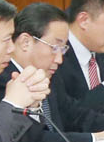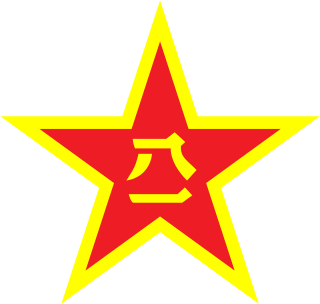
The State Council Information Office is the chief information office of the State Council of the People's Republic of China and an external name of the Central Propaganda Department of the Chinese Communist Party.

The Central Military Commission (CMC) is the highest national defense organization in the People's Republic of China, which heads the People's Liberation Army (PLA), the People's Armed Police (PAP), and the Militia of China.

China News Service is the second largest state news agency in China, after Xinhua News Agency. China News Service was formerly run by the Overseas Chinese Affairs Office, which was absorbed into the United Front Work Department of the Central Committee of the Chinese Communist Party (CCP) in 2018. Its operations have traditionally been directed at overseas Chinese worldwide and residents of Hong Kong, Macau and Taiwan.

The United Front Work Department (UFWD) is a department of the Central Committee of the Chinese Communist Party (CCP) tasked with "united front work." It gathers intelligence on, manages relations with, and attempts to gain influence over elite individuals and organizations inside and outside mainland China, including in Hong Kong, Taiwan, and in other countries.

The Ministry of Foreign Affairs of the People's Republic of China is the first-ranked executive department of the State Council of the People's Republic of China, responsible for the country's foreign relations. It is led by the minister of foreign affairs, currently Wang Yi, who serves as the nation's principal representative abroad. The ministry is headquartered in Chaoyang District, Beijing, the country's primary diplomatic quarter.

Liao Chengzhi was a Chinese politician. He joined the Communist Party of China in 1928, and rose to the position of director of the Xinhua News Agency; after 1949, he worked in various positions related to foreign affairs, most prominently president of the Beijing Foreign Languages Institute, president of the Sino-Japanese Friendship Society, and Minister of the Office of Overseas Chinese Affairs.
The Y. C. Tang Disciplinary Development Fund is an educational foundation of Zhejiang University (ZJU).

The Hong Kong and Macau Work Office (HMO), also known as the Hong Kong and Macao Affairs Office (HKMAO) of the State Council, is an administrative agency of the Central Committee of the Chinese Communist Party responsible for promoting cooperation and coordination of political, economic, and cultural ties between mainland China and the Chinese Special Administrative Regions of Hong Kong and Macau. It was formed in 2023 on the basis of then State Council's HKMAO. Its head office is in Xicheng District, Beijing.
The constituent departments of the State Council are the principal units of State Council of the People's Republic of China. Types of departments include ministries, commissions, the People's Bank of China and the National Audit Office.

Fu Zhenghua is a former Chinese politician and public security officer. In March 2013, Fu was appointed as the Deputy Minister of Public Security (minister-level) and Deputy Communist Party Secretary of the Ministry of Public Security. Since 2015, Fu has served concurrently as the head of the 610 Office. He was also appointed as the Minister of Justice in 2018. Fu was known to be a close ally of Sun Lijun, he has come under investigation in October 2021 and was expelled from the Chinese Communist Party and removed from public office in March 2022. He was subsequently arrested, tried, and given a suspended death sentence.

The Li Keqiang Government was the Central People's Government of China from 15 March 2013, when Premier Li Keqiang took office, until March 2023. It succeeded the Wen Jiabao government. Premier Li is ranked only second to Party general secretary Xi Jinping among 7 members of the 18th and 19th Politburo Standing Committee, top decision-making body of the Chinese Communist Party (CCP).

The president of the People's Republic of China, commonly called the president of China, is the state representative of the People's Republic of China, which on its own is a ceremonial office and has no real power in China's political system. However, since 1993, the post has been held by the general secretary of the Chinese Communist Party (CCP) and chairman of the Central Military Commission, who is China's de facto leader.

The Office for International Military Cooperation of the Central Military Commission is the chief organ under the Central Military Commission of the People's Republic of China for coordinating the People's Liberation Army's relationships with foreign militaries. It grew out of the PLA's Foreign Affairs Office, founded in 1951. It was founded on January 11, 2016, under Xi Jinping's military reforms. Its first director was Rear Admiral Guan Youfei.

The concept of Targeted Poverty Alleviation was first raised by Xi Jinping, General Secretary of the Chinese Communist Party (CCP), to combat poverty in China.

The National Public Complaints and Proposals Administration is a deputy-cabinet level agency directly under the State Council of China. It is the national ombudsman office of the People's Republic of China.

The Office of the General Secretary of the Central Committee of the Chinese Communist Party often referred to as the General Secretary's Office (总书记办公室) is a bureau whose staff is assigned to work directly under, and closely with the Chinese Communist Party (CCP)'s General Secretary. The Office manages personal affairs of the General Secretary and is a part of the Central Committee, but reports directly to the General Secretary. The director of the Office of the General Secretary and the staff under him are considered to be Mishus, or trusted confidants responsible for maintaining the private information and correspondence of the party's leader.

Chen Xu is a Chinese politician and the current deputy head of the Chinese Communist Party's United Front Work Department and director of the Overseas Chinese Affairs Office, in office since 2022. Previously she served as the CCP committee secretary of Tsinghua University. She was an alternate member the 19th Central Committee of the Chinese Communist Party and is a member of the 20th Central Committee.
Guo Dongpo is a Chinese politician who served as president of the China Council for the Promotion of International Trade from 1995 to 1997 and director of the Overseas Chinese Affairs Office from 1997 to 2003.

"One institution with two names" is a bureaucratic arrangement in the Chinese government wherein a government agency exists in name only, and its functions are in practice performed by another agency or a Chinese Communist Party (CCP) organization, so that in effect one institution has two or more governmental brands or trade names to use selectively for political, historical, or bureaucratic reasons. This type of arrangement was historically common until the mid–1980s, but has been extensively revived by reforms which began in 2017.

Wang Xiaoping is a Chinese politician who is the current Minister of Human Resources and Social Security, in office since 30 December 2022.















